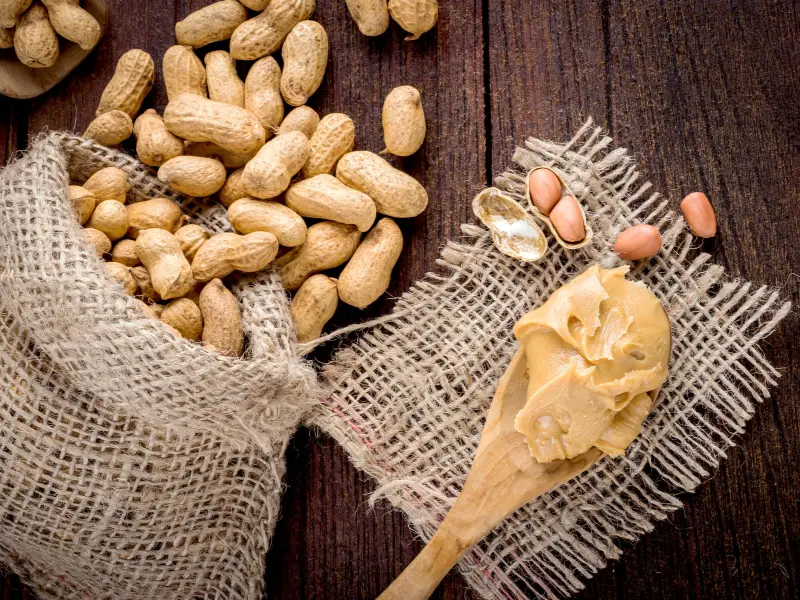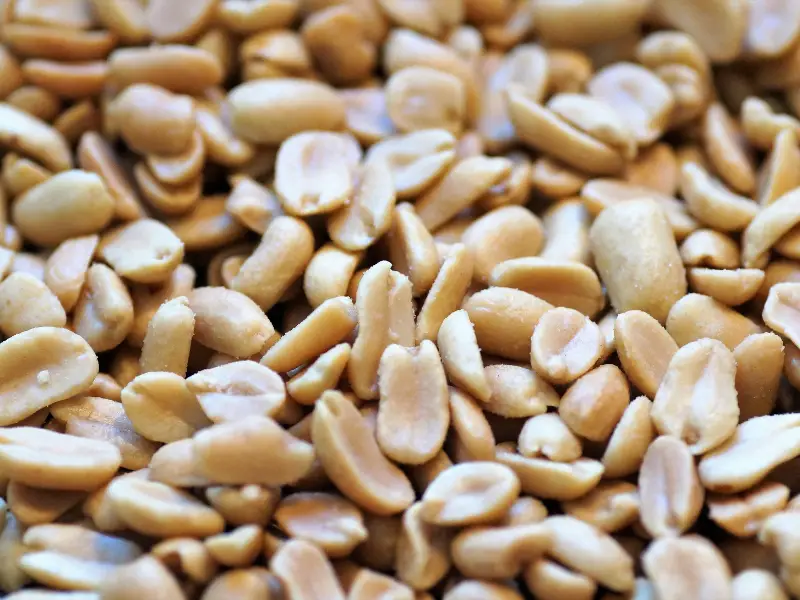Rabbits are known for their love of vegetables, but can they eat peanuts? This is a common question asked by rabbit owners and enthusiasts. While peanuts are a popular snack for humans, it is important to consider whether they are safe for rabbits to consume.
Peanuts are a legume that is high in protein and fat. While they may seem like a healthy snack, they can actually be harmful to rabbits. Rabbits have sensitive digestive systems and are unable to properly digest high-fat foods like peanuts. Eating too many peanuts can cause digestive problems, such as diarrhea and bloating, which can be dangerous for rabbits. Additionally, peanuts can be a choking hazard for rabbits due to their small size.
In general, it is best to avoid feeding peanuts to rabbits. There are many other healthy and safe foods that rabbits can enjoy, such as hay, fresh vegetables, and fruits. It is important to provide rabbits with a balanced diet that meets their nutritional needs. If you are unsure about what foods are safe for your rabbit to eat, it is always best to consult with a veterinarian who specializes in rabbit care.
Are Peanuts Healthy for Rabbits?
Rabbits are herbivores, and their diet should consist of hay, fresh vegetables, and fruits. When it comes to treats, it’s important to choose healthy options that won’t harm their digestive system. Peanuts are a common snack for humans, but can rabbits eat peanuts, and are they healthy for them?
Peanuts are not toxic to rabbits, but they are not recommended as a regular part of their diet. Peanuts are high in fat and protein, which can be difficult for rabbits to digest. Additionally, peanuts are a common allergen for humans, and while rabbits are not known to have peanut allergies, it’s best to avoid any potential risks.
While peanuts are not toxic to rabbits, they can cause digestive issues if fed in large quantities. Peanuts are also high in calories, which can lead to obesity in rabbits if they are given too many. It’s important to remember that rabbits have sensitive digestive systems and should be given treats in moderation.
In summary, while peanuts are not toxic to rabbits, they are not recommended as a regular part of their diet. Peanuts are high in fat, protein, and calories, which can cause digestive issues and obesity in rabbits. It’s best to stick to hay, fresh vegetables, and fruits as the main components of a rabbit’s diet and only give treats in moderation.
Why are peanuts bad for rabbits?

Rabbits are herbivores and their digestive system is designed to break down and process fibrous plant material. While peanuts are a good source of protein and fat for humans, they are not suitable for rabbits. Here are some reasons why peanuts are bad for rabbits:
- High in fat – Peanuts are high in fat which can cause digestive problems in rabbits. Rabbits have a sensitive digestive system and consuming high-fat foods can lead to obesity, liver problems, and other health issues.
- Low in fiber – Peanuts are low in fiber, which is essential for a rabbit’s digestive system. A lack of fiber can lead to gastrointestinal stasis, a condition in which the digestive system slows down or stops working altogether. This can be life-threatening for rabbits.
- Allergies – Some rabbits can be allergic to peanuts. Symptoms of an allergic reaction include itching, swelling, and difficulty breathing. If your rabbit shows any of these symptoms after eating peanuts, you should contact your veterinarian immediately.
- Contain aflatoxins – Peanuts can contain aflatoxins, which are toxic substances produced by certain types of fungi. Aflatoxins can cause liver damage and cancer in rabbits and other animals.
In summary, peanuts are not a suitable food for rabbits. They are high in fat, low in fiber, can cause allergies, and may contain toxic substances. It is important to feed your rabbit a balanced diet of hay, fresh vegetables, and a small amount of pellets to ensure their health and well-being.
Risks of Feeding Peanuts to Rabbits
Feeding peanuts to rabbits is a controversial topic. While some people believe that peanuts are a safe and healthy snack for rabbits, others warn of the risks associated with feeding them to these small animals.
Peanuts are high in fat, which can cause obesity and other health problems in rabbits. Additionally, peanuts contain a high level of protein, which can lead to kidney damage and other health issues if consumed in excess.
Another risk associated with feeding peanuts to rabbits is the possibility of choking. Peanuts are small and hard, and their shape makes them difficult for rabbits to chew and swallow. This can lead to choking, which can be fatal if not treated promptly.
Moreover, peanuts are also known to contain a toxin called aflatoxin, which can be harmful to rabbits if consumed in large amounts. Aflatoxin can cause liver damage and other health problems in rabbits, and it is important to avoid feeding them peanuts that have been contaminated with this toxin.
In conclusion, while rabbits may enjoy the taste of peanuts, it is important to be aware of the risks associated with feeding them this snack. If you do decide to give your rabbit peanuts, make sure to do so in moderation and only after consulting with a veterinarian.
What to do if your rabbit eats too many peanuts?
If a rabbit eats too many peanuts, it can lead to health problems. Some of the symptoms of peanut toxicity in rabbits include diarrhea, vomiting, and lethargy. In severe cases, it can also cause seizures and even death. If you notice any of these symptoms in your rabbit after it has eaten too many peanuts, you should take it to a veterinarian immediately.
Here are some steps you can take if your rabbit has eaten too many peanuts:
- Remove peanuts from the rabbit’s diet: If your rabbit has eaten too many peanuts, you should remove them from its diet immediately. You should also avoid giving it any other high-fat foods.
- Provide plenty of water: Make sure your rabbit has access to plenty of fresh water. This will help prevent dehydration and flush out any toxins from its system.
- Monitor your rabbit’s behavior: Keep a close eye on your rabbit’s behavior and look out for any signs of distress. If you notice any changes in its behavior, contact a veterinarian immediately.
- Feed your rabbit a balanced diet: Make sure your rabbit is getting a balanced diet that includes hay, fresh vegetables, and a small amount of pellets.
- Seek veterinary care: If your rabbit shows any signs of distress or if you are concerned about its health, seek veterinary care immediately. A veterinarian can provide treatment and monitor your rabbit’s condition to ensure it recovers fully.
In summary, if your rabbit has eaten too many peanuts, it is important to take immediate action to prevent further health problems. Remove peanuts from its diet, provide plenty of water, monitor its behavior, feed it a balanced diet, and seek veterinary care if necessary.
Other Food Alternatives for Peanuts
While peanuts can be a tasty treat for rabbits, they are not the only food option available. Here are some other food alternatives that rabbits can enjoy:
1. Hay
Hay is a staple food for rabbits and should make up the majority of their diet. It is high in fiber and helps keep their digestive system healthy. Timothy hay, orchard grass, and meadow hay are all good options.
2. Vegetables
Rabbits can also eat a variety of vegetables. Leafy greens like lettuce, kale, and spinach are great choices. Carrots, bell peppers, and cucumbers can also be given in moderation.
3. Fruits
Fruits are a tasty treat for rabbits, but they should be given in moderation due to their high sugar content. Apples, bananas, and strawberries are all good options.
4. Pellets
Pellets are a convenient way to provide rabbits with a balanced diet. Look for pellets that are high in fiber and low in protein and fat.
5. Water
Water is essential for rabbits to stay hydrated and healthy. Make sure your rabbit always has access to fresh, clean water.
In summary, while peanuts can be a tasty snack for rabbits, they are not a necessary part of their diet. A balanced diet consisting of hay, vegetables, fruits, pellets, and water will provide all the nutrients your rabbit needs to stay healthy and happy.
Conclusion
In conclusion, it is safe for rabbits to eat peanuts in moderation. Peanuts are a good source of protein, fiber, and healthy fats, but they should not be a staple in a rabbit’s diet.
It is important to note that some rabbits may be allergic to peanuts, so it is recommended to introduce them slowly and monitor their reaction. Additionally, peanuts should always be unsalted and unflavored, as added ingredients can be harmful to rabbits.
Rabbits should primarily consume hay, fresh vegetables, and a small amount of pellets as their main diet. Treats like peanuts should only be given occasionally and in small amounts, as they can lead to obesity and other health problems if overconsumed.
Overall, while peanuts can be a tasty treat for rabbits, it is important to remember that they should not make up a significant portion of their diet. As with any new food, it is recommended to consult with a veterinarian before introducing peanuts or any other new food into a rabbit’s diet.
Related Articles:

